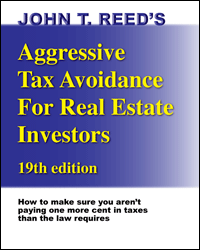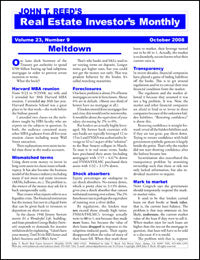Trump tax return bumbling
Posted by John Reed on
I said releasing tax returns of a billionaire is probably a bad idea because the public can’t understand them and you opponent will spin them against you.
It’s worse than I thought. I said if he did not pay taxes for one or more year, it’s probably because of loss carry-forwards. It now seems that is the case.
But we are now talking about him “exploiting,” “taking advantage of,” and “fixing” that “loophole.”
What!?
If you lose more money than you took in in one tax year, you are allowed to deduct the excess loss the following year. Actually, I believe the law says something like you can deduct the excess from the prior three years taxable income by filing amended returns for those years, or you can carry them forward for up to 15 years.
That’s not a loophole. It’s common sense. To not allow that would be to treat all businesses like lottery winnings and losses: winning are taxable and losses are not deductible. Is that the “fix” Trump is promising? That would make all businesses far more loss averse meaning there would be far fewer jobs.
And people keep saying it was all right for him to choose to avail himself of that tax break.
What!?
Your tax accountant does not even ask you if you want to use your carried forward losses to lower this year’s income tax. It’s automatic. If Trump said, “No, go ahead and pay a bunch of taxes I don’t have to pay,” his family would rightly use that as evidence to have a guardian appointed for his financial affairs.
Trump has perhaps a world-record loss carryforward of almost a billion dollars. To paraphrase Trump, “That means he’s dumb.”
So Trump has not avoided taxes because of arcane, rich-people loopholes that mainly only exist in Democrat mythology. Rather, he is using an absolutely fair, sensible, and ancient clause that lets you apply legitimate deductions you cannot deduct this year to the last three or the next fifteen years.
As I predicted, Hillary is dishonestly spinning that as tax evasion, a crime, but Trump is incapable of explaining it the way I just did. Or even of telling his tax lawyer to explain it. That also means he’s dumb.
I wrote THE BOOK on being smart about taxes, at least in real estate investing which is what Trump does to an extent. Aggressive Tax Avoidance for Real Estate investors, 19th edition.
 Did Trump read that book? I do not know. I do know he asked me to contribute to a book he wrote title the best real estate advice I ever got from the 100 best real estate investors in America. I was one of whom he called the top 100. I sent in my contribution to the book then demanded it not be used when I found Robert Kiyosaki, author of Rich Dad Poor Dad was also in it. They removed me before publication.
Did Trump read that book? I do not know. I do know he asked me to contribute to a book he wrote title the best real estate advice I ever got from the 100 best real estate investors in America. I was one of whom he called the top 100. I sent in my contribution to the book then demanded it not be used when I found Robert Kiyosaki, author of Rich Dad Poor Dad was also in it. They removed me before publication. I got audited that year and the IRS auditor never heard of credit for prior year AMT. But she checked and her bosses said it was allowed. Many readers told me their accountant first denied it existed, then admitted it did.
I got audited that year and the IRS auditor never heard of credit for prior year AMT. But she checked and her bosses said it was allowed. Many readers told me their accountant first denied it existed, then admitted it did.An example of leaning in your own favor in a judgmental area would be choosing the correct improvement ratio on a business property. You can depreciate the building but not the land.Your purchase price includes both. So you want the percentage allocated to the building to be as high as possible. There are several ways to calculate it. Choose the one that gives the highest improvement ratio.
Share this post
0 comment
